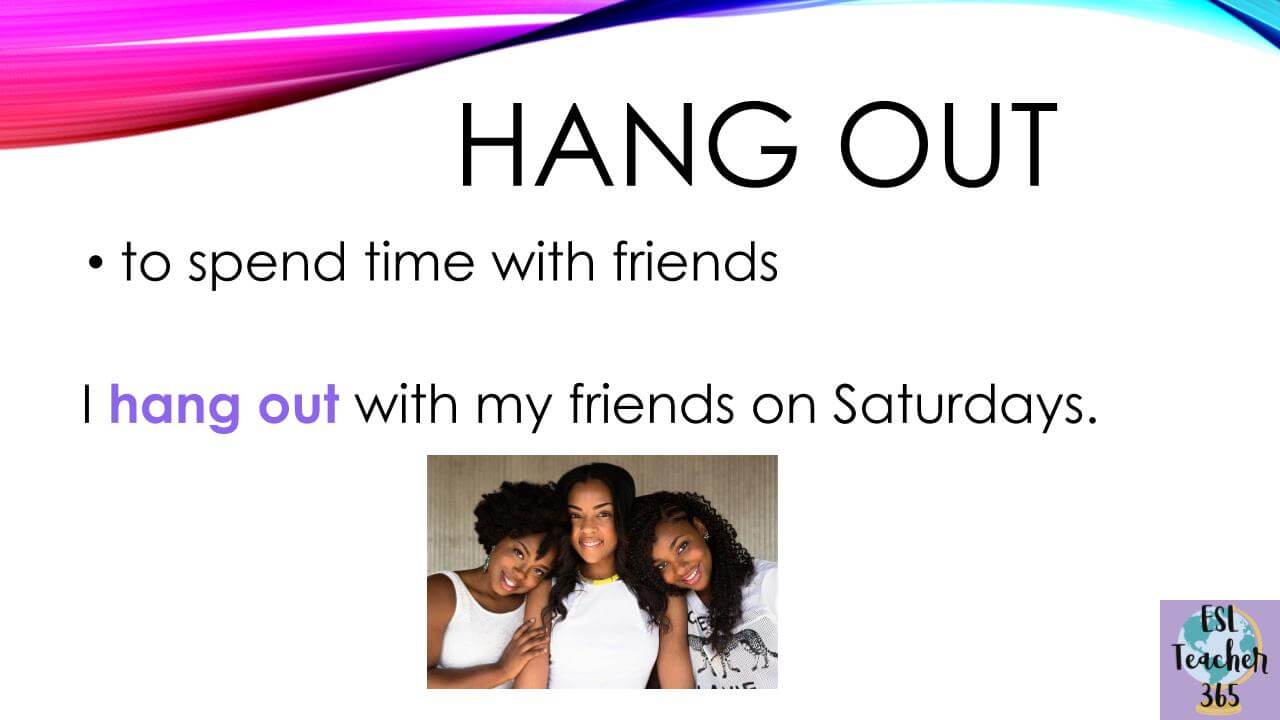Phrasal verbs help you speak English like a native speaker. In this post, you’ll learn 10 phrasal verbs about friends and family. Try to use these phrasal verbs when you are speaking and writing!
Post Contents
What is a phrasal verb?
For beginners, you just need to understand that a phrasal verb is a verb plus a word or words.
The meaning of the phrasal verb is different than the words by themselves.
Example: Break up
Normally, break = to stop working, to come apart into pieces and up = the opposite of down
However, the phrasal verb “break up” = to end a relationship.
Jake and Samantha decided to break up. = Jake and Samantha decided to end their relationship.
Phrasal verbs about Friends

When your friend is sad, how do you cheer them up? Maybe you invite them to your house, buy them a small gift or take them to dinner.

If you are sick, who can you count on? Think of the person who is the first to come and help. You can count on that person to be there for you.
Do other people count on you? Both friends and family count on you for help.

Right now because of the pandemic, some people cannot go out. Before Covid-19, where did you like to go out?
Where is your favorite place to go out with friends? Do you prefer a restaurant, club or bar?

When we hang out with friends, it means we relax or do something fun together. You can hang out at a friend’s house, a bar or a park.
Do you like to hang out with friends or do you prefer to spend time alone?

When do you meet up with friends? Do you meet up after school or work?
Where do you like to meet up? At the gym, at a restaurant or cafe, or in a park?
Phrasal Verbs about Family

Do you get along with your brother or sister? Who do you get along well with in your family? When you get along with someone, you enjoy spending time with them.
If you are always fighting with someone in your family, you don’t get along well with them.

When we talk about the phrasal verb “grow up,” it means the time from birth until 18.
Where did you grow up? I grew up in the United States, but now I live in Australia.
We also use grow up to talk about what job we want when we are older. “When I grow up, I want to be a singer.”

When we look after someone, we take care of them. That person could be a baby, young child, or even a grandparent. We can also look after our friends and animals.
Looking after someone means we are responsible for that person or animal and we help them. Who do you look after?

When you take after someone in your family, you are similar to them. I take after my mom because we both like animals and holidays, I also take after my dad because we like sports. I take after my aunt because we both have light brown hair and blue eyes.
Who do you take after in your family?

When we look up to someone, we think they are amazing. The are kind, talented or inspiring.
You can look up to people in your family, friends or even famous people. Who do you look up to?
Practice: Phrasal Verbs about Friends and Family
Complete the sentences with the missing phrasal verb. Answers are at the end of this post.
1. Every weekend I _____________ with my friends at the park.
2. When I _____________, I want to be a teacher.
3. Do you want to come over to my house to ________________?
4. My sister lost her favorite book so I got her a new one to _________ her ________.
5. I really _______________ my grandfather because he always works really hard.
6. Do you ______________ your mother or your father?
7. I can’t go to the movie because I need to _______________ my little brother tonight.
8. Do you want to ____________ to eat or to a bar tomorrow night?
9. The person I can _____________ the most is my brother.
Final thoughts
Phrasal verbs help you sound like a native speaker. Try to practice them as much as possible.
Try this Au Pair English Guide to learn more English vocabulary or this English for beginners: Family vocabulary lesson.
Practice your listening skills with this short story listening lesson.
Practice Activity Answers
- hang out / meet up
- grow up
- hang out
- cheer up
- look up to
- take after
- look after
- go out
- count on





